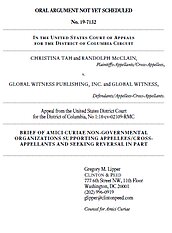Learn more about Cato’s Amicus Briefs Program.
What would cause the Cato Institute, the South Poverty Law Center, the Council on Foreign Relations, Oceana, and Oxfam to join forces on an amicus brief? A critical defamation lawsuit that could threaten the First Amendment rights of any organization that does business in Washington, D.C.
Global Witness is a London-based NGO with a D.C. office that specializes in “exposing economic networks behind conflict, corruption, and environmental destruction.” In 2018, the organization published a report alleging corruption in a deal between Exxon and the government of Liberia. The deal was for off-shore drilling rights, and it was accompanied by the payment of large bonuses to various Liberian officials. The report had 125 footnotes and even contained pre-publication comments from the government officials denying that the bonuses were bribes.
Two of those officials sued Global Witness for defamation. The D.C. district court dismissed the lawsuit because Global Witness’s report was correctly deemed First Amendment-protected speech. Now on appeal to the D.C. Circuit, an important question remains about whether D.C.’s Anti-SLAPP statute should be applied in federal court.
A “SLAPP” lawsuit—which stands for “strategic lawsuit against public participation”—is a lawsuit that the plaintiff does not necessarily intend to win. Instead, the intent is to intimidate and effectively censor speech through the burden of legal costs. Because of the danger of such suits to free speech, many states and jurisdictions have “anti-SLAPP” laws that allow defendants in such suits to get early dismissal and to recover legal costs. The D.C. Council passed an anti-SLAPP law in 2010, but such laws generally only apply in D.C. city courts rather than federal courts.
But there is a complex set of doctrines that determine when a state law—or in this case D.C.’s law—should apply in suits in federal courts. Cato has joined with that diverse collection of NGOs to argue that D.C.’s anti-SLAPP law should apply in federal courts. D.C.’s anti-SLAPP law doesn’t conflict with any federal rule and it creates substantive protections for First Amendment activities. If the law doesn’t apply in federal courts, then plaintiffs filing SLAPP lawsuits will find reasons to “forum shop” by filing in federal court to deprive defendants of the protection of D.C.’s anti-SLAPP law.
D.C. is the thriving center of our political discourse, which is why so many organizations joined together on this brief. Courts shouldn’t allow plaintiffs to silence First Amendment-protected speech by simply walking a few blocks to file in the federal courthouse. Federal courts in D.C. should apply D.C.’s anti-SLAPP law and slap such suits to the curb.

This work is licensed under a Creative Commons Attribution-NonCommercial-ShareAlike 4.0 International License.
